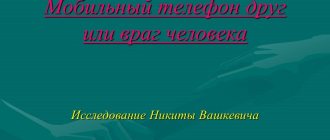Computer class hour
Class hour “The computer is an enemy, a friend, a helper”
Target:
Discuss with students that a computer can be a helper, an enemy and a friend; formulate rules when working on a computer.
PROGRESS OF THE CLASS HOUR
Teacher:
The computer quickly entered our lives. Just a few years ago it was rare to see any kind of personal computer - they existed, but they were very expensive, and not even everyone could have a computer at home. And now? Now every second home has a computer, which has already become deeply ingrained in human life. – Do you have a computer at home? (Children's answers) - Listen to a story written by one of our school students.
My friend the computer
Grandfather Abdullah gave my dad a computer for his birthday. Dad was very happy: “This friend needs to be allocated a certain room right away.” And when I looked at him in surprise, he said: “Yes, yes, he will be a friend of our entire family, and especially yours.” So they installed this friend in a separate room. Dad is now reading something on the computer, mom is typing, and grandfather is planning how to build a dacha. My dad taught me how to work on a computer. I play different games with him, draw, write poetry, study mathematics, English, Russian, Bashkir. My friend can also play chess. I find it interesting to be with him, and he never gets boring. Grandma says that we shouldn’t abuse friendship, we need to take a break from each other, otherwise it will be harmful to our health. Therefore, I meet with the computer once a day for 15 minutes. It’s no longer possible, because I still have many other friends at school, in the yard, on the street.
– For what purposes can you “start” a personal computer at home?
After listening to the children’s answers, the teacher concludes: using a home computer, appropriate software and peripheral devices, you can:
- play computer games; – carry out text processing when writing documents; – learn foreign languages, study history and other subjects; - paint; – play “musical instruments”; - create your own programs.
Students mainly use the computer for games, writing essays, and reports. Which, in general, is good for studying, therefore, the computer is our assistant! - Or an enemy? When can a computer become an enemy? (Children's answers) Computers are especially harmful to children's health. Even if your computer is safe and meets quality standards, it can still cause harm to you. – What dangers lie in wait when working with this smart machine? (Children's answers)
1. The computer operates under high electrical voltage, and faulty wiring may result in electric shock or fire in the monitor (if the ventilation holes are blocked). 2. Electromagnetic radiation from various computer parts, primarily from the monitor and system unit, is dangerous. 3. Heavy strain on the eyes during long-term work at a close distance from the monitor screen leads to deterioration of vision. 4. Increased noise levels during computer and printer operation create additional stress on the brain. 5. Low air humidity, high dust content and a lack of air ions (light negatively charged oxygen molecules) in the room where computers operate lead to a decrease in the human body’s immunity. 6. Additional stress on the spine and fatigue occur if the workplace is not organized correctly. 7. Increased neuropsychic and emotional stress when working on a computer is dangerous. Remember how you experience playing computer games.
There can't be too much information
but the information may be redundant
November 26 is World Information Day , which has been held annually since 1994 on the initiative of the International Academy of Informatization ( IAI ). On this day in 1992, the first International Informatization Forum took place. Today World Information Day is celebrated in many countries around the world.
In grade 6 “A” (class teacher E.V. Kocherova) a thematic class hour was held.
Schoolchildren learned that information, in a broad sense, is information transmitted by one person to another person orally, in writing or in some other way (for example, using conventional signals, using technical means), as well as the very process of transmitting or receiving this information .
Information has always played a very important role in the life of mankind. And since the mid-20th century, as a result of social progress and the rapid development of science and technology, the role of information has increased immeasurably. Currently, the global trend has become the modernization of television broadcasting through the transition to digital technologies, the development of high-speed Internet and mobile communications. Russia also follows this trend. One of the most important areas of informatization of Russian society is the development of Internet technologies in many sectors of human life and society as a whole.
Information is almost the main value in the modern world. Everyone knows the famous phrase: “He who owns the information owns the world.” Moreover, its number is growing every day. The digital future, which we could not even think of before (PC, mobile phone, Internet, tablet...), is becoming a familiar digital present.
Every year this holiday becomes more and more important on our planet. After all, the media are developing every second, and technologies previously unknown to mankind have become a person’s everyday environment. We live in a world of computer technology and, thanks to the World Wide Web, we can transmit and receive data from anywhere on the planet. Young people are beginning to forget about the existence of libraries, because there are any books on the Internet, many of which are not there. With the help of a mobile phone, each of us is always in touch with loved ones and acquaintances. Thanks to television, we develop intellectually and learn regional and international news.
But it is important to note that in addition to this, there is also an avalanche-like increase in the mass of various information, called the “information explosion.” And here it’s not far from “information stress”. Recently, psychologists have started talking about the fact that the inability to use information technology and the information received, or rather, to control its quality and volume, leads to so-called “information stress ,” which can be fraught with both social consequences and health problems. And it’s important to remember this.
Information resources are knowledge, ideas of humanity and instructions for their implementation, recorded in any form, on any information medium.
In relation to an individual state, they talk about national information resources, including library and archival resources, scientific and technical information, industry information, information from government (government) structures, information resources in the social sphere, etc.
In the modern world, the role of computer science, means of processing, transmitting, and storing information has increased immeasurably. Information science and computer technology now largely determine the scientific and technical potential of the country, the level of development of its national economy, the way of life and human activity.
For the purposeful use of information, it must be collected, transformed, transmitted, accumulated and systematized.
The emergence of global information networks and systems for the first time in the history of our planet opens up the opportunity to connect literally everyone with everyone, provide access to the information resources of human civilization to any inhabitant of the Earth, combine today's knowledge and spiritual values, and, therefore, significantly expand the boundaries of the application of cultural, scientific and technology.



